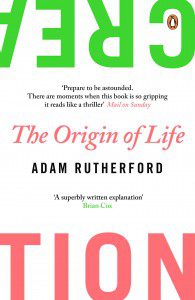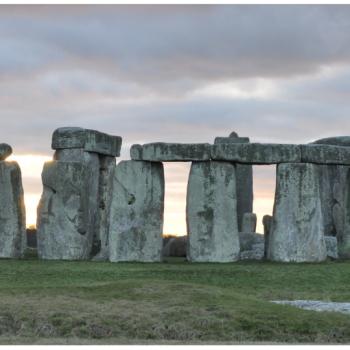 Adam Rutherford, Creation: The Origin of Life / The Future of Life
Adam Rutherford, Creation: The Origin of Life / The Future of Life
(Penguin, 2014)
I very nearly decided not to review this book. I’m certainly stretching the theme of “Pagan, Shinto & Spiritual” by including a work of popular science, and I feared that I would annoy both scientists and religious people alike (or at least those who aren’t both!) by including Creation: The Origin of Life / The Future of Life in this review. However, I did review a work of hard sci-fi last month that seemed to be well-received, and what’s more, it relates very much to Alison Leigh Lilly’s excellent recent Patheos article “Scientists Discover Life’s Common Ancestor, An Ancient Living Ocean“, which is all about LUCA, the Last Universal Common Ancestor of all life on Earth and who features prominently in Creation.
Creation is the work of Dr Adam Rutherford, a bit of a celebrity scientist in the UK who also happens to be an incredible speaker (I was lucky enough to attend a lecture of his last year). The book attempts to answer, in layman’s terms, some of the most fundamental and difficult questions about life: what life actually is, how it came to be, and the potential of science to unravel and make use of some of its secrets. Creation is split (in a rather gimmicky manner) into two books; you flip the book upside-down in order to read the other one. The intention is that you can read the books in either order, but to be honest it seems far more logical to read The Origin of Life first, as this explains the beginnings and make-up of the basic unit of life, the biological cell, together with DNA (it’s here that we learn all about LUCA). The Future of Life talks about biological research and the ways in which scientists are working to manipulate cells and DNA in order to modify living things, and even work towards creating artificial life forms.
Although written in a highly engaging and often humorous tone, Creation is serious science. Rutherford successfully distils complicated ideas into very short and easy to understand explanations, but as a result the information is densely packed – don’t blink or you’ll miss an important point. Aside from being completely fascinating, this book makes a very convincing case for genetically modified organisms. Yes, seriously. I consider myself an environmentalist, and I can see that there are too many potential benefits lying in genetics to completely dismiss genetic engineering as “playing God,” or otherwise being too dangerous to even attempt. While Ruthford does perhaps gloss a little over some of the concerns, both environmental and ethical, surrounding genetic engineering, he challenges our usual clear-cut concepts of “natural” verses “unnatural,” and also demonstrates that in many cases, overreaction from environmentalists has slowed the progress of genetic engineering that would otherwise save lives. I believe that is an important point and one that all environmentalists should seriously think about before challenging GMOs. Ruthford certainly made me think.
All Pagans with an interest in science (which I think is the greater percentage of Pagans out there) will find Creation a gripping and enlightening read. As I’ve mentioned before, for Pagans of humanistic/naturalistic tendencies, learning about science is in some ways an act of worship, as it is how we get to know that which we hold most sacred – life itself.
















